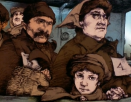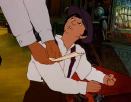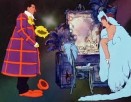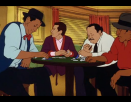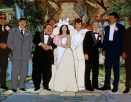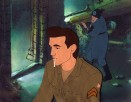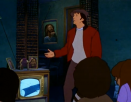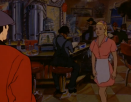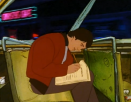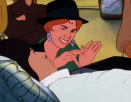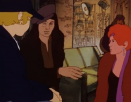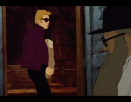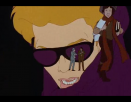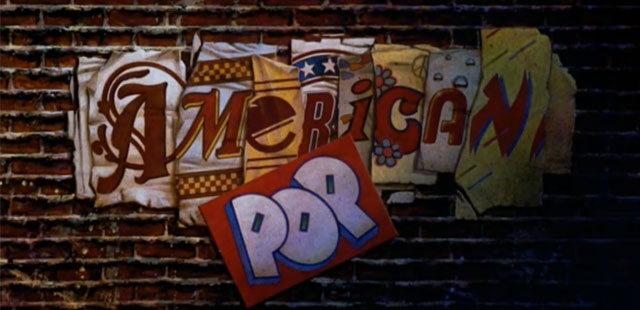
American Pop is an amazing journey through the family tree of four generations of a Russian Jewish immigrant family of musicians and songwriters as told through the american music scene. Family matters, heirlooms, relationships and music. In my opinion, this is the best movie following a family tree throughout generations that has ever been attempted. That is follows popular American music is an added bonus, but at it’s heart this film is about family.
It almost seems like a four act play: Prelude, the Rabbi’s wife and Zalmie escape a Russian pogrom; Act I, Zalmie falls in love with Bella and they have a son Benny; Act II, Benny marries into mob has a son Tony; Act III, Tony has a son, Little Pete with a blonde girl in Kansas on his way to California; Act IV, Tony and Little Pete get to know each other; Epilogue, Little Pete hits it big. In fact, I could see this on Broadway. (I wonder why no one has tried?) There is more to the story than that, but it’s a succinct way of splitting up the movie, and it’s how I’m going to organize this Rotospective piece.
The opening credits of this movie deserve an art exhibition of their own. Paintings, sketches, pictures, they just keep coming at you, one after another, each a unique piece unto itself. It’s a little thing that I’m sure most people gloss over, but it’s there and it’s fantastic.
Prelude
This portion of the film is very reminiscent of the old silent films. Although there are sound effects and music in the scenes, it’s narrated by intertitles as it tells the story of a Russian pogrom. The Rabbi’s wife and Zalmie, escape the pogrom, but the Rabbi stays behind, because the prayer must be finished. This may appear as foolish to some, but Bakshi, growing up in a Jewish/Italian family, knew how strict the Orthodox Jews could be to the rules of their religion. The immigration is on and we see Zalmie and his mother on a boat in New York harbor with the iconic Statue of Liberty in the background.
The interlude that takes us into New York City is impeccable, it is overlaid with old video and old photos of New York in the Roaring Twenties. Bakshi always manages to inject real art into his film. It’s something captured in the backgrounds of all his films, but here he also uses them to tell part of the story.
Act I
In a nightclub, Zalmie is recruited by Louie to help him pass out chorus slips for a penny. This is Zalmie’s introduction into the entertainment industry. His first night is a success, though his mother worries because he’s out late. Of course, the dancers and other moving characters in these clips are rotoscoped in front of amazing paintings and interspersed with old time film clips of the era. At the end of his first night on the job, is an aerial shot of New York City, very reminiscent of one used in Fritz the Cat.
Next we see Zalmie, not as a kid, but as an adolescent working on his penmanship backstage at a show among the dancers, meanwhile his mother dies in a fire at the sewing shop where she was working to support them.
Next, we see Zalmie, as a teen, singing in a vaudeville show. Louie talking backstage is warned that Zalmie’s voice will change, and he says, “well, let it change… Who says it has to change bad, maybe it’ll change good.” Louie appears to have that kind of positive outlook on life, even though at times, it appears he doesn’t always believe it.
World War I breaks out and Louie sends Zalmie and the rest of his Vaudeville troupe over to France to entertain the troops. It is there, as the ass end of a horse, headed by Louie that a 17 year old Zalmie asks Louie when his voice will change for good, as he doesn’t “want to be a horse’s ass forever.” At the end of their act, there is an attack on the base and Zalmie gets shot with a stray bullet.
Louie, visiting Zalmie in the hospital, ignores the usual plesantries of how are you doing/feeling/etc, sits down and says, “so, you’re voice finally change.” Fast forward back to the New York Vaudeville circuit. Where Zalmie finds love at first site with Bella, one of the dancers.
He goes to talk about Bella with Louie, saying that he’s “seen the most beautiful thing in the world… She was like a rose.” The conversation turns into age, Zalmie says to Louie, “When we first met I thought you were an old man. Now, older I get, younger you get.” Louie answers with, “amazing, ain’t it? Pretty soon we’ll be the same.”
“You want this girl kid? So, go get her?” “Right now?” questions Zalmie. “Right now, right now. In this business, you wait five minutes, you’ll be older than both of us.” It’s quite an amazing sentiment. I don’t presume to know much about old vaudeville, but I’m sure there’s more this conversation about getting older than meets they eye, I just don’t have the eyes to see it.
Zalmie goes to Bella and they both slowly undress, apparently this isn’t unrequited love at first sight. Fast forward to them dancing together, where Zalmie is trying to convince Bella she can be a singer, because “singers get to sit on pianos and things, strippers is always on their feet. Ain’t you always telling me how your tootsies is achin’?”
To make Bella a star, Zalmie goes to Louie, who says that he could’ve been a star himself, as a great comic. But Zalmie simply replies, “it’s the music that I love.”
In a nightclub, a pregnant Bella is talking to a pianist about a song, while the mob boss, Nicky Palumbo walks in. Palumbo walks over to Zalmie and says, “your girls getting fat.” “Pregnant” answers Zalmie. “Don’t you think it’s time for a wedding?” “How can I ask her? I don’t have a cent.” “You should have thought of that before you got her pregnant.” “Who thinks at a time like that?” One of Palumbo’s men comes buy drops some money on the table and tells him to go get married, “this is a wholesome place.”
Louie and Zalmie are now in with Palumbo, they’re part of the mob. Zalmie says he doesn’t like this business, he “loved show business.” Fast forward to Bella singing in a fancy hall and Zalmie sitting with his son Benny at a table with Palumbo. Louie’s talking about a record deal, and asks Benny what he thinks. The “kid never talks, Zalmie” which is responded by “He will when he’s got something to say.” Then in comes some gangsters on a hit and bullets fly through the club.
Next, to the tune of “Sweet Georgia Brown,” we see a compilation of mob hit after mob hit. Some gun fights, some fist fights, drive by shootings, even a chair thrown through a window. This isn’t all done simply with animation, there are some actual photographs from the days of prohibition, edited into the compilation as well, and they are pretty gruesome at that.
Zalmie, Louie, Palumbo and another man are playing poker, while Bella stands by the piano Benny is playing. Bella and Zalmie are arguing over what Benny’s going to be, Zalmie says piano player, Bella says suergon when the doorbell rings and a package arrives. Bella picks it up, but is unaware of the danger. By the time Zalmie can act, it’s too late. The explosive package goes off. With that, it’s the end of Act I.
The character traits of Zalmie are prevalent throughout the future generations of his family. His love of music and show business for example, are in one way or another, passed down through the generations.
Act II
The transition from Act I to II is Benny sitting at the piano as a kid transitioning to Benny as a man playing “Sweet Georgia Brown” in a club with a band. When the song ends, Zalmie is trying to convince Benny to make a record at RCA, and be a star. This is just part of it, Zalmie wants Benny to marry a girl, Mr. Palumbo’s daughter to be more precise. He follows this request with, “if you won’t live my dreams then live my life, all right?” Benny agrees.
Next, we see the wedding party, pictures being taken of them and all the of first dances. They are in full color, in front of a beautifully painted house background. But when Benny and his new bride go into their new house, the coloring is all done in shades of blue, to the tune of “As Time Goes By,” a clear nod to Casablanca if I ever saw one.
“What are the two of us supposed to do in this big house?” “Make three, four or five” is his new bride’s answer. “Is that what you want?” “I want… you to smile,” is her reply. This is another common theme. Zalmie, Benny, and those that come after in the family, always seemed focused and determined, yet they never seem to really be happy or comfortable enough to smile. With the exception of when they are doing what they love, music. It’s a very small detail, but I think it has a huge significance.
If doing what you love makes you happy, then do it. Those who love you, should support these decisions, although life can always deter such decisions. Again, this is a very important thing to grasp. Do what you love, do what makes you happy. Right here in this little exchange, we seem to have answers for all of the questions at the beginning of “Heavy Traffic,” but then again, life can and usually will get in the way.
The next time we see Zalmie and Benny, Zalmie is enraged that Benny has enlisted in the army with a pregnant wife at home. What transpires next is transfixing.
“I need a steady job.”
“What are you talkin’ a steady job? You got a steady job here!” (The job is playing piano ata club)
“Oh, Pops. This isn’t work. This is play.”
“So play, Benny. You’re just a kid.”
“No, Pops. No, I’m not.”
“Benny. Look, I gave. All right? I gave at the office.”
“But you took too.”
To the tune of “Sing, Sing, Sing,” we see people dancing in clubs mixed, with scenes of war. People having fun and people dying. Couples dancing, strippers dancing, machine gun fire cutting down men where they stand. The dancing, the strippers and the scenes of war all all rotoscoped. There remain two interesting parts to this scene.
One, the dancing couples are of many races. Bakshi, doesn’t make his movies monochromatic, there are many different races of people dancing. He’s always been progressive in infusing his films with the rainbow of races that make up our world.
And two, the strippers that were rotoscoped for this are amazingly well animated. I don’t pretend to know much about art, but I do know that the human form is hard to draw, and a nude moving female can’t be any easier.
The jazz music ends and we see Benny, playing “As Time Goes By” on a harmonica, in a foxhole with other soldiers, tapping his foot on his helmet for a beat. The others give him a hard time for playing it, but he smugly replies, “it’s hard to fit a piano in a foxhole.”
Shortly thereafter, on a raid through a seemingly deserted town, Benny finds a piano, sits down and starts to play, “As Time Goes By.” A wounded Nazi creeps up behind him, and Benny stops for a moment and then plays “Lilli Marlene,” a German love song. The Nazi soldier seems to enjoy this and says, “Danke” before killing Benny.
Back in New York, Benny’s widowed wife is getting a talking to from her father, Mr. Palumbo. Palumbo, leaves the room to watch the trials on TV. After eight years in prison, Zalmie is going to testify against Palumbo, he’s going to “sing like a bird.” Palumbo, isn’t happy about this, but he wants Tony to see this. Why, is Zalmie going to “sing?” Because his Benny told him that he “took” and now it’s time to give back. Not quite what Palumbo wanted Tony to see, but Tony gets to see his grandfather on TV none-the-less. Palumbo is going off about Zalmie “singing” and Louie replies, “Sing… Sure. That’s all he ever wanted.”
Television and radio announcers and news bulletins are heard as we get a flyby of an amazing painting of New York City and with that Act II to finished.
Act III Tony
Zoom in on an underground beatnik poetry bar, “I saw the best minds of my generation destroyed by madness. Starving hysterical, naked.” Tony and a friend are sitting at a table in the bar. His friend leaves and Tony is alone. He stays awhile and leaves for home.
He takes the bus home to where he is staying with his woman who has three other children. When he arrives there, they are all staring at the television. Maybe it was the poem, you can easily arrive at a conclusion that “best minds of my generation destroyed by madness. Starving, hysterical, naked” means television. But whatever it is, he’s hot under the collar.
“So, what’re you watchin?”
“Tv”
“Wonderful”
“You’re watching tv. Tv, you can watch if it’s on or off! I shut if off, you’re still watching tv.”
“Turn it on”
“Well, what are you watchin’?”
“A show, we’re watchin’ a show.”
“‘a show.’ Their brains is fallin’ out like teeth. Did you get your quarter? Huh? Did the brain fairy leave ya a quarter last night? I’m talkin to you!”
“We’re ignoring you Tony. Mom said to ignore you. She said you’re going through a phase.”
“A phase. Now I’m a goddamn moon.” The kids cover their ears. Tony continues, “that’s right you catch ’em, you catch ’em! Your brains is falling out! Your ears are falling off…”
There is a hint, to Tony speaking of his mother listening to a record, where he mumbles, “what do you care, he wasn’t your father.” This is interesting. Tony’s mom, who never gets a name, but surely has one, is still pining for Benny, Tony’s father.
Tony goes up to his room, grabs some money and his father’s harmonica, goes outside, steals a car and heads west, to the tune of “Turn Loose.” The music that Bakshi selected for this movie is dead on. It fits the time period of whatever particular scene is happening and it fits the mood of that scene as well. I’m not sure, whether Bakshi listened to hours of albums or he had these songs in mind while directing, but they all fit so well, each and every time, I don’t think it’s just a series of happy accidents.
Four weeks later, after having picked up a few hitchhikers along the way, Tony pulls to the side of the road and gets out of the car. He yells to a man, “Hey, Where are we?” “Kansas” is the reply. After he demands a moment of silence for their trip to West of the Mississippi, he turns and says, “I think it’s time I go alone.” “What about the car?” they want to know, “it’s yours” he replies, walks a few paces, turns around and yells, “it’s stolen!” They all get out of the car and go their separate ways, except for one woman, who sits on the hood of the car and says, “For sale.” Again, like all Bakshi films, little humor like this is interjected throughout.
Tony walks to a cafe, where he stares through the glass window at a waitress, who see him and asks him if he wants a job. He says he wants her. He takes the job, if only for the night. Trying to get her attention all night. After they close up, she asks if he will be back tomorrow, and he replies no.
The two walk through a cornfield. “Kansas is corny” he yells. Lie in the corn with me he says. “Are you crazy? I’m crazy in love with you!” I’ll never eat corn without thinking about you. Canned corn, candy corn, popcorn cracker jacks, you’re the prize in my box… Come wander the country with me.” She won’t but as this is his night in Kansas, she takes his hand and well, you know.
The next morning, Tony is riding the rails making music with the hobos with his father’s harmonica. The scenery fades into another cafe, panning to dirty dishes and Tony sitting out back.
“Hey, DiNoble [Tony], what are you doin’?”
“Thinkin’.”
“Thinkin’ of what?”
“Clean thoughts.”
“Then how come my dishes are dirty?”
“Dirty?”
“Dirty.”
“Well, them poor dumb little bastards. They never learned the power of positive thought.”
“I thought you said you was a dishwasher.”
“I’m a dishwasher.”
“I am a dishwasher! My hands is permanently puckered! But you know what? The thrill is gone. That’s what happens when you turn pro. Even that first batch of suds, that first spraying of palmolive over troubled waters, that first plunge through the foam that first hopeful fish for a dish– It is gone, Charley. It is gone. And I think it’s time that I’m movin on.”
“Where, where ya gonna go Tony?”
“West! West! Where else can a man go that needs elbow room?”
“And what the hell do you need elbow room for?”
“I’m thinkin’ of takin’ up the accordian.”
“Hey, you’re not gonna make it in this business, Tony. You can’t sing. You play guitar like a duck.”
“That’s ’cause my hands is permanently puckered.”
“And anyway, This is California. There ain’t no further West to go.”
And Tony walks off. This is an important dialogue. Tony is smart, he’s a poet and it’s walking down the street in California that someone here’s him playing “California Dreamin'” on his harmonica and asks him to come up. Tony enters, introduces himself and is offered some weed. “Hey. Try some of this? Did you ever get high before?” “Only when I can afford it,” is Tony’s reply. “How often is that?” “uh, never.” Such a wit, Tony has.
It’s apparent that the invitation for him was because of the song he played on his harmonica. The band wants to know what he can do and he responds with I’m a writer. They ask him to bring some over and he heads out. He tells them it will be a while, because he has to walk, when he is offered a bus pass. On the bus he starts to write.
The band, equipped with Tony’s songs starts to do well. During one practice session, Frankie, the lead singer, starts to get wound up when they make a mistake, one of the band members says they’re doing fine. “Fine” she says, “Fine, I don’t want hear fine. You don’t make it on fine. Nobody cares about fine. Everything’s gotta be perfect. And this is our shot.”
“It’s just a gig.” No, she replies, “It’s not just a gig. This is our time. This is our time, guys and it’s slippin’ right through our fingers.” Frankie needs a fix, so she goes to Tony for it and he obliges.
The next thing we see, is real Sixties music festival footage with the animated band, belting out “Somebody to Love.” The song continues with footage from the Vietnam War and the band the animated on a very trippy background. More raw footage of the troubles of the Sixties continues as the song plays on. Tony takes a drink from some punch and has a bad trip both figuratively and literally. After he drinks the punch he starts to hallucinate and Frankie pulls him up on stage. The hallucinations consume him and he breaks his arm falling off the stage.
The band visits him in the hospital, where Frankie says that they have a number one album and they bought him a typewriter with some of their advance on the next one. Once Tony gets out, he finds himself, drug addicted, alone and looking for a fix to “People are Strange”, the band has moved on with their tour. This scene too, like the conversation Benny has with his new wife in the big empty house, is also done in blue. Tony isn’t hurt by them moving on, but when he reads in the paper, that Frankie married the band’s dummer, he goes to a very dark place.
He catches up with the band in a recording studio. Frankie is drinking with no abandon. A few guys in the band say he’s not looking so good and one gives him the advice, “Hey man, if you can’t hold your stuff, don’t use it.” Well, that may be great advice, but when Frankie comes out, she admits she’s nothing with out him.
To the tune of “Purple Haze” we see Frankie and Tony helping each other shoot up, as a prelude for things to come. The transports us to a concert where a very well animatedJimi Hendrix performing “Purple Haze” as an opener for the band. Tony and the band are hanging backstage when some asks where they are. Kansas City is the response, Tony, doesn’t hear it at first, he’s pretty out of it.
Backstage, amongst the complaining about going on after Jimi Hendrix, the band’s manager takes note of a blonde kid, Little Pete. Frankie comes to his rescue, saying that he can stay, but one look from Tony, a flashback to his Kansas fling, and he knows the truth. The confirmation of the band that they are indeed in Kansas puts Tony over the edge, but still he knows the truth, Little Pete is Tony’s son.
Tony can’t handle this truth and he wanders outside and into a corn field freaking out. I’m sure that his feelings, coming face to face with his long lost son, and his drug addiction were to much to handle. He relives his first trip through Kansas and the blonde over and over again. By the time he makes it back to the venue, he sees Frankie being carried out on a stretcher, the victim of a drug overdose.
Act IV Tony and Little Pete
Back to New York, it’s apparent that Little Pete is aware Tony is his father. The kid acts more like a parent to Tony, still asking for lessons on writing songs, but to no avail. Little Pete goes shopping, tries to get Tony to eat, also to no avail.
Tony is always looking for a fix and has taken up dealing drugs in New York. Little Pete takes up writing songs anyway. Following Tony around on his deals, trying to protect him as best he can. Little Pete start playing the guitar on the street and Tony takes the money for more drugs. Then sitting on a bench, Little Pete who is trying to make it and asks tony for help, but all he says is “Go back to Kansas.” Little Pete says no, it’s too flat. He’s convinced that New York is Everest.
Tony tries to pawn the Little Pete’s guitar. Little Pete tries to resist. Tony gives Little Pete, Benny’s harmonica, telling him that it belonged to his father and he tells him about Benny. This is truth, but it’s the first time, their father-son relationship is acknowledged.
Tony takes the guitar, “Now you stay right there…”
“til hell freezes over, Tony”
“til hell freezes over, it already did.”
As Tony leaves, Little Pete plays, “As Time Goes By,” on the family harmonica.
Epilogue
The next day, a messenger shows up with drugs, telling Little Pete, that “he said not to sell it all in one place.” Little Pete asks if he said anything else, “Yeah,” the messenger replies, “he said to say… goodbye.”
The scene and transforms years later into Little Pete as a man. To “Hell is for children” Pete is working is rounds as a drug dealer. Stopping to get groceries and he even stops by a temple and grooves to the rabbi’s prayers. That’s called coming full circle.
Pete, stop home and plays a little piano, before we’re treated to some Eighties post modern punk of “We’re vacant” as a very interesting video, the colors, the fashion, the dancing, the backgrounds, all the while Pete, the drug dealer, is making his rounds. The stills during this are amazing and like the music, it’s all period based.
Pete’s next stop is a recording studio. Where he withholds the drugs unless they play his songs. “I have been runnin’ and fetchin’ for you bunch of punks for three years now and I don’t want to be no Candy man no more… It’s not the money, man… I want you to play one of my songs.” They say they’ll listen to one.
“Night Moves” is the one song. As it starts the studio execs upstairs at the studio seem unimpressed, but the still of their producing booth, comes to life and soon more people crowd in. This transitions to Pete in concert, playing the harmonica as an intro into “Blue Suede Shoes,” which starts a laser infused concert performance with a medley of songs, “Devil with the Blue Dress,” “Crazy on You” and then we see the flashbacks throughout the film and his family history…
The end is a mix of rotoscope and just filtered video, finishing with the last song being “Free Bird” over the credits, which was the song that Bakshi wanted for the penultimate song that started the medley, but as is often the case, money finds a way to get in the way of art. None-the-less, I find that Night Moves works better lyrically, as it’s based more in love and physicality, as was Pete’s father’s, Tony’s life…
In Conclusion
This brings us to the conclusion of a four generation story through hitting it big in American popular music. But there’s more to say. Through all four generations, we follow a mainly patriarchal path. Zalmie, who immigrated with his mother has a close relationship with Louie, we don’t follow much of Zalmie and his mother. Zalmie, who’s wife gets killed has a fairly close relationship to Benny. Benny, never gets to be a father to Tony and Tony only briefly has a relationship with Little Pete, and I wouldn’t classify that relationship as father-son, unless Little Pete was the father.
The family trait of loving music, that is seen throughout all four generations, is beautifully woven into the fabric of the story, in such an amazing way both, by writer Ronni Kern and director Ralph Bakshi, that it’s hard not to see the previous generations as we’re introduced to the next.
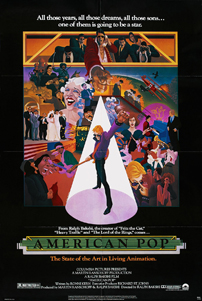 The overall movie, gives you the feel of watching a documentary at times. Following four generations in one movie is a monumental task, that Bakshi manages to do in one hour and thirty-six minutes. The movie isn’t too long, it isn’t too short. There is a lot to comprehend in American Pop, it’s a movie that is especially re-watchable.
The overall movie, gives you the feel of watching a documentary at times. Following four generations in one movie is a monumental task, that Bakshi manages to do in one hour and thirty-six minutes. The movie isn’t too long, it isn’t too short. There is a lot to comprehend in American Pop, it’s a movie that is especially re-watchable.
The music, the art, the rotoscoping and animation, the plot, the writing, it all adds up to an amazing movie, through almost every era in American popular music through the Eighties. Would I like to see Pete’s son? Would I like to see the early Nineties Grunge and the transformation of popular music by boy bands and teen wonders? It would be interesting, but it wouldn’t work. The four generations in American Pop cover a lot of musical changes in American music, but there were almost that many changes from the late Eighties into the early millennium and that’s just 20 years.
This movie works for the time periods, musical eras and underground movements it covers. Simply put this movie just works. From a boy and his mother, escaping death in a Russian pogrom to Pop Super-stardom, this movie is a wonderful ride through history. Maybe someone should make it into a play for Broadway after all.
